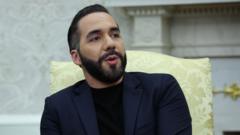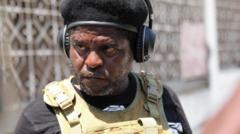El Salvador's President Nayib Bukele has announced that Kilmar Ábrego García, a Salvadoran national wrongfully deported to El Salvador from Maryland, will not be returned to the U.S. The decision follows a Supreme Court ruling mandating his return, highlighting ongoing tensions between U.S. immigration policy and El Salvador's deportation practices.
El Salvador Declines to Return Deportee Amid Controversy Over Misidentification

El Salvador Declines to Return Deportee Amid Controversy Over Misidentification
President Nayib Bukele reaffirms commitment to hold Kilmar Ábrego García, mistakenly deported from the U.S., despite Supreme Court ruling favoring his return.
El Salvador has made headlines following President Nayib Bukele's determination not to return Kilmar Ábrego García, a Salvadoran national who was mistakenly deported from the United States. Currently held in a controversial mega-prison in El Salvador, Ábrego García's case has drawn significant attention, particularly due to the U.S. Supreme Court's ruling last week that indicated the Trump administration must "facilitate" his return.
During a meeting at the White House with former President Donald Trump, Bukele reiterated his stance against returning Ábrego García to the U.S., framing it as a matter for El Salvador to decide. The relationship between Trump and Bukele has been notably strong, with Trump previously commending Bukele for his hardline approach to crime and for agreeing to accept U.S. deportees, which aligns with Trump's initiatives for mass deportation.
The U.S. authorities, while acknowledging that Ábrego García's deportation was due to an "administrative error," contend that he is associated with the notorious MS-13 gang—an assertion his lawyer vehemently denies. U.S. Attorney General Pam Bondi stated that the responsibility lies with El Salvador to decide whether to return Ábrego García, thus complicating the legal narrative surrounding the case.
Despite the Supreme Court's mandate for action, Trump's administration navigates these complicated legal waters by emphasizing the issue as governmental foreign policy rather than a matter for U.S. immigration law. It has also been reported that 238 Venezuelans and 23 Salvadorans were deported to El Salvador, with many facing similar allegations of gang affiliations.
Amid these developments, U.S. Secretary of State Marco Rubio announced that more alleged gang members would be sent to El Salvador, despite existing legal challenges to these deportations. Critics have expressed concerns over human rights abuses in the Salvadoran mega-prison, known as the Center for the Confinement of Terrorism (Cecot), where many deportees have been sent.
The unfolding dynamics highlight the complexities of immigration policy between the U.S. and Central American countries while underscoring the broader implications of bilateral relations and internal governance in the context of crime and deportation practices.



















